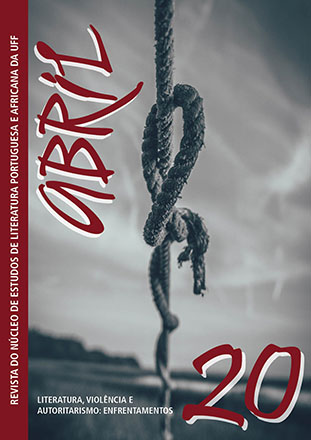Under and on the authoritarism of the silence: marks on the Portuguese narrative in the post-1974
DOI:
https://doi.org/10.22409/abriluff.v10i20.29954Keywords:
Post-1974, secrets, passions.Abstract
In the book Exortação aos crocodilos, by António Lobo Antunes, axes of powers press a group of four women, at the end of the 70s, in the post-Salazar period; thereby, reactions of discomfort fertilize in the novel, in which female voices express organically – by the body, on the body – reactions to times of such apprehension and instability. Although the book represents the post-dictatorship period, the wealth and the symbology of censorship and repression are sensitively expressed in the present of the four women, at the resemblance of a secret, unrevealed, unsaid presence, and manifest themselves as an authority yet. A silence flows throughout the work in the sense of translating times of an inefficient democracy, in which prevails the maintenance of the secrets. Nevertheless, the work reveals instants in which the secret, pushed forward by passions, bends the law of the silence, in order to provoke discursively the effect of disobedience, of disauthorization of the law and of the order. This article projects its discussion around the potential of the secrets revelation, whose instantaneous apparitions deserve to be illuminated for the purpose of taking in testimonies in times of amnesia and amnesty.
---
Downloads
Downloads
Published
How to Cite
Issue
Section
License
I authorize the journal Abril - NEPA/UFF to publish the paper of my authorship/responsibility that I now submit, in case it is accepted for online publication.
Moreover, I declare that this contribution is original, that it was not submitted to any other editor for publication, and I sign the present declaration attesting the truth of all its contents.
The copyright of the works published at the virtual space of the journal Abril - NEPA/UFF are automatically entitled to the journal. Their total or partial reproduction is conditioned to the authors' citations and publication data.

Abril is licensed under a Creative Commons - Attribution-NonCommercial 4.0 International (CC BY-NC 4.0).









